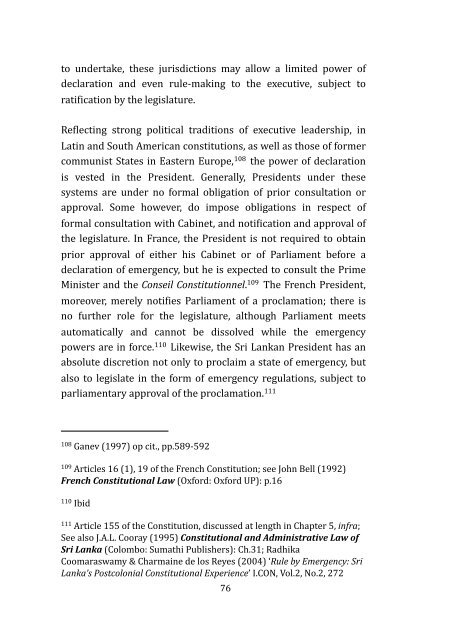States of Emergency - Centre for Policy Alternatives
States of Emergency - Centre for Policy Alternatives
States of Emergency - Centre for Policy Alternatives
Create successful ePaper yourself
Turn your PDF publications into a flip-book with our unique Google optimized e-Paper software.
to undertake, these jurisdictions may allow a limited power <strong>of</strong><br />
declaration and even rule‐making to the executive, subject to<br />
ratiLication by the legislature.<br />
ReLlecting strong political traditions <strong>of</strong> executive leadership, in<br />
Latin and South American constitutions, as well as those <strong>of</strong> <strong>for</strong>mer<br />
communist <strong>States</strong> in Eastern Europe, 108 the power <strong>of</strong> declaration<br />
is vested in the President. Generally, Presidents under these<br />
systems are under no <strong>for</strong>mal obligation <strong>of</strong> prior consultation or<br />
approval. Some however, do impose obligations in respect <strong>of</strong><br />
<strong>for</strong>mal consultation with Cabinet, and notiLication and approval <strong>of</strong><br />
the legislature. In France, the President is not required to obtain<br />
prior approval <strong>of</strong> either his Cabinet or <strong>of</strong> Parliament be<strong>for</strong>e a<br />
declaration <strong>of</strong> emergency, but he is expected to consult the Prime<br />
Minister and the Conseil Constitutionnel. 109 The French President,<br />
moreover, merely notiLies Parliament <strong>of</strong> a proclamation; there is<br />
no further role <strong>for</strong> the legislature, although Parliament meets<br />
automatically and cannot be dissolved while the emergency<br />
powers are in <strong>for</strong>ce. 110 Likewise, the Sri Lankan President has an<br />
absolute discretion not only to proclaim a state <strong>of</strong> emergency, but<br />
also to legislate in the <strong>for</strong>m <strong>of</strong> emergency regulations, subject to<br />
parliamentary approval <strong>of</strong> the proclamation. 111<br />
108<br />
Ganev (1997) op cit., pp.589‐592<br />
109<br />
Articles 16 (1), 19 <strong>of</strong> the French Constitution; see John Bell (1992)<br />
French Constitutional Law (Ox<strong>for</strong>d: Ox<strong>for</strong>d UP): p.16<br />
110<br />
Ibid<br />
111<br />
Article 155 <strong>of</strong> the Constitution, discussed at length in Chapter 5, infra;<br />
See also J.A.L. Cooray (1995) Constitutional and Administrative Law <strong>of</strong> <br />
Sri Lanka (Colombo: Sumathi Publishers): Ch.31; Radhika<br />
Coomaraswamy & Charmaine de los Reyes (2004) ‘Rule by <strong>Emergency</strong>: Sri <br />
Lanka’s Postcolonial Constitutional Experience’ I.CON, Vol.2, No.2, 272<br />
76











